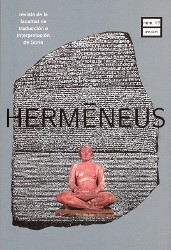Reflexiones sobre la traducción al español de los parlamentos dialectales en la novela <em>Sons and Lovers</em> de D. H.Lawrence
Abstract
El uso del dialecto en las obras literarias siempre ha planteado retos interesantes a los traductores ya que las variedades dialectales normalmente tienen connotaciones socio-culturales que no suelen tener correspondencias en los dialectos de otros idiomas. Este trabajo tiene como objetivo examinar las dificultades a que se enfrentan los traductores a la hora de traducir al español el dialecto de la novela Sons and Lovers y analizar las pérdidas socioculturales y sociolingüísticas derivadas de las inequivalencias lingüísticas en la traducción al español del dialecto. El análisis del modo en que D. H. Lawrence usa el dialecto se hace desde una perspectiva sociolingüística centrando la atención sobre cómo las traducciones al español no sólo no tienen en cuenta su uso simbólico en la sociedad como rasgo de identidad de grupo, sino que también descuidan aspectos sociolingüísticos del original como la importancia del dialecto para delimitar las relaciones y valores que definen a los personajes. Palabras clave: variedad dialectal, dialecto, variedad lingüística, aspectos sociolingüísticos, traducción literaria, D. H. Lawrence. Abstract Some thoughts on the translation into Spanish of non-standard dialect in D. H. Lawrence’s Sons and Lovers Luisa María GONZÁLEZ RODRÍGUEZ The use of nonstandard varieties of language in literary texts has always been an interesting challenge for translators since dialects usually encode socio-cultural connotations that have no equivalent in the dialects of other languages. This article focuses on the difficulties translators have to overcome in order to translate dialects with the aim of revealing socio-cultural and sociolinguistic aspects that will be missing as a result of not having an equivalent dialect at their disposal when translating into Spanish the dialect of Sons and Lovers. The analysis of Lawrence’s handling of dialect is addressed form a sociolinguistic perspective focusing on how the Spanish translations not only obliterate its symbolic role in society as a marker of group identity but also neglect some sociolinguistic variables inherent in the original such as the importance of dialect in delimiting values and relationships defining the main characters. Key words: nonstandard variety, dialect, linguistic variation, sociolinguistic variables, literary translation, D. H. Lawrence.Downloads
Published
2011-11-03
Issue
Section
Artículos

